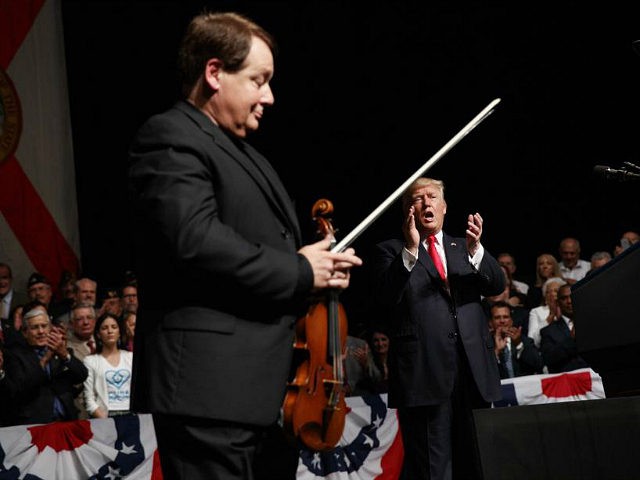Granma, the official state newspaper of the communist government of Cuba, has published a column calling the father of violinist Luis Haza, who played “The Star-Spangled Banner” at President Donald Trump’s address last week, a “murderer” and “Batista henchman.”
Author Sergio Alejandro Gómez’s bitter screed also accused Haza, a Grammy-award-winning violinist and world-renowned music educator and human rights advocate, of playing the American national anthem “off-key” and President Trump himself of delivering an “erratic” address.
Trump traveled to Miami to announce major reforms to the country’s Cuba policy, which the Obama administration had modified in 2014 to greatly benefit the Castro regime.
The Granma piece does not identify author Gómez or specify his musical credentials in judging the quality of Haza’s performance.
“From an off-key violin come the notes of the United States anthem. An erratic Donald Trump dusts off the rhetoric of the Cold War,” the author writes, describing the Bay of Pigs Veterans Association as “the old terrorist guard that killed in the name of the CIA and was left waiting for the American boat that would take them back to Cuba.”
The 2506 Brigade – the Bay of Pigs Veterans – are a group of Cuban-American patriots who attempted to liberate the island from the yoke of the Castro regime in the 1960s. President John F. Kennedy doomed the operation by first promising the Cubans air support in their operation, then denying it after encouraging the fighters to land on the island.
Granma routinely refers to the Bay of Pigs freedom fighters as “terrorists,” while embracing leadership of the wealthiest non-jihadist terrorist organization in the world – the Revolutionary Armed Forces of Colombia (FARC) – as freedom fighters.
The Bay of Pigs veterans offered President Trump their first-ever presidential endorsement before the general election last year.
The Granma column on Trump’s Cuba address last week reserves a particular bitterness towards Haza, however, condemning Trump’s decision to showcase his talent. Trump, the column reads, “chose to bring to the stage, violin in hand, the son of a Batista henchman from Santiago de Cuba, a murderer who was involved in the death of Frank País.”
País was an anti-Batista operative largely considered the mastermind of the overthrow of the president. País was killed at age 22, just as the ideological rift between himself and Fidel Castro, who had fled the true battle against Batista in the cities to impress the New York Times with a Sierra Maestra camping trip, began metastasizing.
“It was Frank who was in front of the [anti-Batista] organization throughout the island,” a Miami Herald column on their relationship explained, “while Castro ran the incipient guerrilla that, for many months, depended on País for its survival.” Had País survived, many Cuban historians have speculated, Fidel Castro – who never won an election in his life – would not have had a clear path to totalitarian rule on the island.
Granma not only fails to tie Haza’s father to Frank País’s death and mention that País did not support communism, it also leaves the pertinent detail unsaid that Haza’s father initially supported Castro before it became clear that he was a communist. According to Town Hall:
By the time Fidel Castro rode victoriously into Santiago, the prevailing belief (including among the island’s business leaders) was that Castro’s overthrow of Batista would lead to democracy and free elections. Col. Haza believed democracy was Cuba’s destiny and stood with Castro on a stage soon after.
But it became evident that Castro neither believed in nor would support democracy; Col. Haza withdrew his support.
Within a few days, Col. Haza was forced into a dark cow pasture where he and 70 other prisoners were executed under the direction of Raul Castro, Fidel’s younger brother and now Cuban president.
Granma was not the only Cuban government outlet to make this accusation. CubaDebate, for example, blamed Haza’s father directly for País’s death while calling his violin performance “horrendous and off-key.”
In Miami on Friday, President Trump announced that his government would eliminate the “individual people-to-people” travel option for U.S. citizens, which had been subject to abuse by wealthy would-be American tourists willing to fund the Castro regime through its tourism properties.
Trump used the opportunity to praise Cuban pro-democracy dissidents, freedom fighters, and victims of the brutal Castro regime. Trump made clear his goal was to starve the Cuban military, limiting its ability to repress its own people and support rogue allied states like Iran, Venezuela, and North Korea.
The Cuban government responded with a screed condemning the United States for alleged human rights violations and claiming that “the Cuban people enjoy fundamental rights and liberties.”

COMMENTS
Please let us know if you're having issues with commenting.